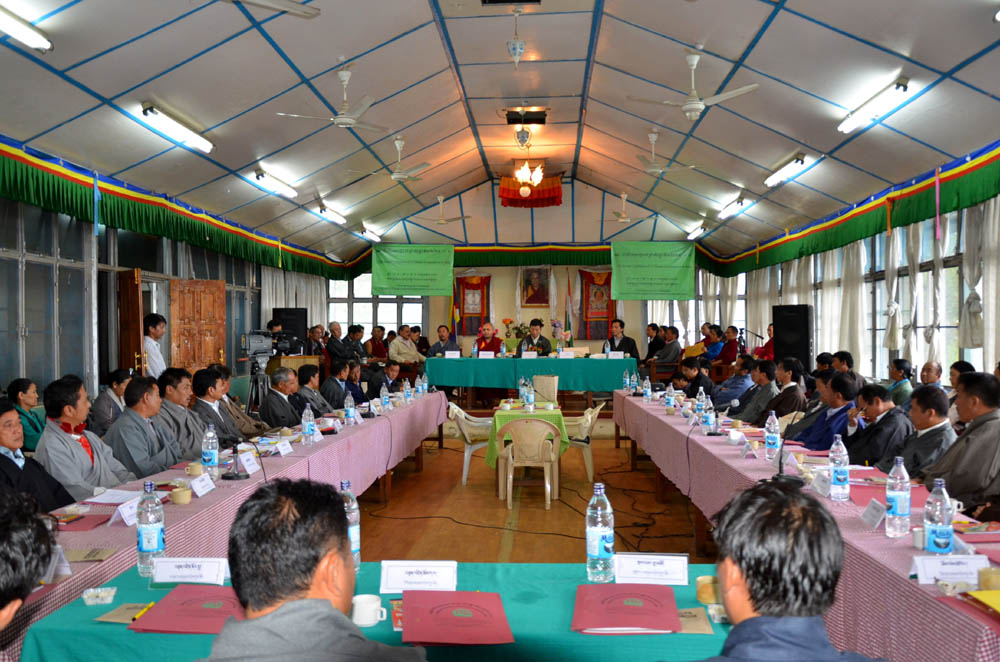 Dharamshala: Nyamdel, the Federation of Tibetan Co-operatives India Ltd, commonly called "The Federation," held the first day of its 11th general board meeting today, August 11. The first day of the three-day conference took place at the Staff Mess of the Central Tibetan Administration in Dharamshala, India. Kalon Tripa Dr. Lobsang Sangay, the newly elected Tibetan political leader, was the chief guest.
Dharamshala: Nyamdel, the Federation of Tibetan Co-operatives India Ltd, commonly called "The Federation," held the first day of its 11th general board meeting today, August 11. The first day of the three-day conference took place at the Staff Mess of the Central Tibetan Administration in Dharamshala, India. Kalon Tripa Dr. Lobsang Sangay, the newly elected Tibetan political leader, was the chief guest.
A total of 60 delegates including Chairmen, secretaries from the 15 branch Tibetan Co-operatives and 3 members from each board of directors are participating in the conference. The secretaries of various departments of the Central Tibetan Administration, members of the standing committee of the Tibetan Parliament in-Exile, and representatives of Tibetan non-governmental organizations also attended the opening day.
The Deputy Speaker of the Tibetan Parliament in-Exile, Ven. Sonam Tenphel released a book entitled Co-operative Movement in Tibetan Community in Exile: Commemorating 50 Years in Exile. Secretary of Home Ngodup Dorjee Sogtoe released the Foundation's Summer 2011 Newsletter.
The Federation has 150 braches in India, Nepal and Bhutan and employs 500 permenant and 500 temporary staff. 60% of Tibetans in exile depend on the co-operatives for their income, said Tashi Wangdue, director of the co-operative, during his introductory remarks.
The event was Sangay's first official conference as Kalon Tripa. Sangay said, "The work and projects of the Federation are very compatible with my three fundamental principles: unity, innovation, and self-reliance."
A detailed report on each settlement is contained in the book. Each report includes a summary of the history of the settlement, a list of objectives, land and population statistics, financial data, a description of their activities, and photos.
The organization was started to help Tibetan co-operative societies in exile. The co-operative societies themselves were started to help the rehabilitation and sustainability of Tibetan refugees.
Tibetan co-operative societies supply agricultural inputs, help the members market agricultural products and handicrafts, provide services like purified water and cement bricks, set up weaving centers, supply essential goods, and help the refugees financially and with employment.
According to the Nyamdel website, the Federation was started to provide a "common forum for the cooperatives to exchange discussion on ideas, challenges, successes."
The cooperatives also needed a central organization to market their handicrafts and agricultural products.
The Federation, formed in 2005, seeks to "promote social and economic betterment in the interests of its member co-operatives through self help and mutual aid," according to the Summer 2011 edition of their newsletter.
In the book's preface, Chairman Pema Delek states that the co-operative economic model is "free of violence, exploitation and could contribute tremendously towards the attainment of community sustainability without relying on governments or big industries for meeting a large percent of the people's needs."
Sangay said that on his own visit to the Tibetan settlements and saw the agricultural cooperatives, weaving initiatives, flour mills, and school buses for local students, all arranged by the cooperatives.
"These things are the cause of your hard work and activities, and I ask that you continue to do your best," he said.
Sangay advised attendees to comply with Indian law, as the Federation is now registered with the Indian government. He also told them to turn to chairman of the Federation Pema Delek and the CTA's Department of Home for anything they may need.
It is important, he said, for Members of Parliament to visit the settlements and for the people living there to explain their needs to these government officials.
The Federation works closely with the Central Tibetan Administration. A message from the former Kalon Tripa Prof. Samdhong Rinpoche, printed in the book, states that both the communist and the capitalist systems have failed at promoting values such as love, friendship, peace, and stability. The co-operative system, he said, relies on humans working together and having compassion.


![Tibet has a rich history as a sovereign nation until the 1950s when it was invaded by China. [Photo: File]](/images/stories/Pics-2024/March/Tibet-Nation-1940s.jpg#joomlaImage://local-images/stories/Pics-2024/March/Tibet-Nation-1940s.jpg?width=1489&height=878)















